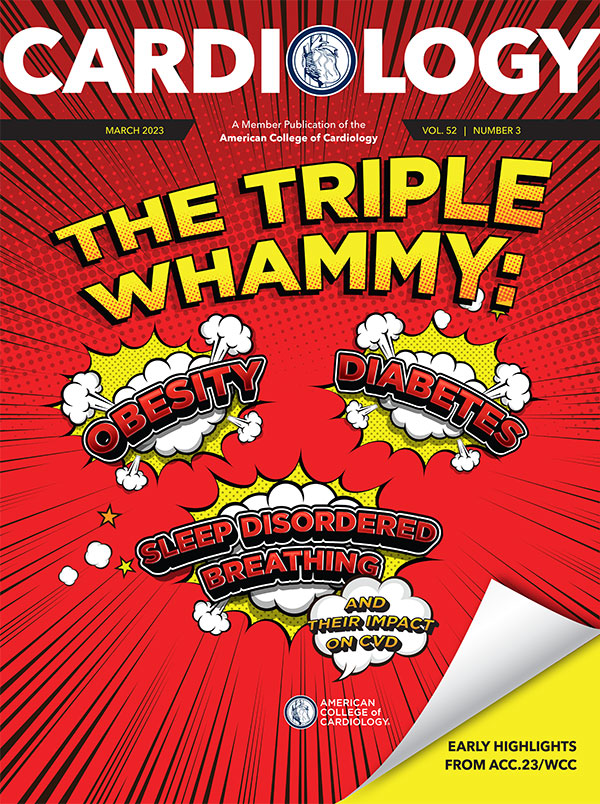Feature | State of the States: ACC Chapters Drive Progress to Transform Care, Improve Heart Health For All

ACC's Chapters, representing all 50 U.S. states, as well as Washington, DC, Puerto Rico, Mexico and Canada, are critical to advancing the College's Mission to transform cardiovascular (CV) care and improve heart health for all. Together, these Chapters continue to make great strides in advancing science, knowledge and innovation to optimize patient care and outcomes, while also playing crucial roles in fostering community, collaboration, professionalism, equity and leadership growth among clinicians spanning the entire CV care team.
The 2022 State of the States Report provides a snapshot of these efforts and highlights the incredible amount of work – and real progress – being made towards advancing solutions to heart health. The successes in the state showcase grassroots work being done to achieve the College's Strategic Pillars aimed at increasing the relevance of the ACC as the CV professional home; generating and delivering actionable knowledge; advancing quality, equity and value of CV care; and ensuring organizational growth and sustainability. ACC Chapters are fertile ground for innovation and catalysts for action, and the examples that follow from the past year are testament to these facts.

ACC as the CV Professional Home
With more than 56,000 members around the world, ACC Chapters are vital to helping cardiovascular clinicians find their "home" at the College. Programs like the Alabama Chapter's Dinner Program for Fellows in Training (FITs), which brings FITs from fellowship programs at the University of South Alabama and University of Alabama at Birmingham together for dinner and speakers on topics like financial planning and contract negotiation, offer an introduction to the College and provides a path from FIT to FACC. Similarly, the Massachusetts Chapter's new FIT Workshop provides an opportunity for FITs to connect with ACC leaders and hear from experts on topics like social media, mentorship and innovative careers in cardiology.
ACC Chapters are also key to helping women find a place in the College and the profession. In 2022, the Illinois Chapter hosted its 5th Annual Midwest Women in Cardiology Symposium as a hybrid meeting featuring speakers from all over the U.S., including former ACC President Kim Allan Williams, MD, MACC, whose talk was live streamed from France. The Wisconsin Chapter will be hosting this event in 2023. Additionally, the Arizona Chapter held its 9th Annual Arizona ACC Women in Cardiology in-person meeting in November 2022, which included focused discussions on topics like equity in cardiology, employment contract negotiations, work-life balance, and the changing landscape of practice settings.
Integrating the CV team has also been a priority, with many Chapters, including Michigan and Wisconsin, finding unique ways to integrate these members into their annual conference through activities like poster presentations, dedicated educational sessions and more.

Delivering Actionable Knowledge
The COVID-19 pandemic has forced a rethinking of how knowledge is delivered, while at the same time in-person meetings and learning started to resume in 2022. On the innovative front, the Ohio Chapter launched its "CardiOhio" podcast to provide chapter members with timely, continuous education in an easily accessible fashion. Each podcast episode addressed a practical topic in clinical cardiology (i.e., new clinical guidelines) using an interview format with specialists from across the state. The initial 2022 "season" consisted of eight episodes and saw more than 1,000 total downloads. The Iowa Chapter hosted a hybrid four-part Advanced Imaging Lecture series in May and June of 2022, featuring internationally renowned faculty. The successful series was well attended, and more than 2,600 individuals have viewed the series on the Chapter's YouTube Channel to date.
Annual conferences are the hallmark events for nearly every chapter, with many including Arizona, Kansas, Louisiana, Minnesota, Missouri, Nebraska, Northern New England, Oklahoma, Washington and West Virginia, reporting successful returns to live meetings and strong attendance across member types, including FITs and the CV Team. Topics of discussion focused on new clinical guidelines, practice-changing research, health equity, advocacy and more.
The sharing of knowledge with ACC International Chapters and other global cardiovascular societies also made great strides in 2022. The New Jersey Chapter re-engaged with the Hellenic Society of Cardiology, hosting the Society's members for a welcome dinner at ACC.22 in Washington, DC, and sending leaders to the 2022 Panhellenic Congress of Cardiology. The Nevada Chapter sent leaders to the 2022 European Society of Cardiology Congress in Spain, as well as Bangladesh, while the Texas Chapter sent a small group of members to participate in a cultural exchange at the Brazilian Symposium, which also happened to coincide with the World Cup. The Virginia Chapter celebrated the fifth anniversary of its exchange partnership with the British Cardiovascular Society (BCS), which turned 100 in 2022. To honor the historic BCS anniversary, the Chapter created and funded a "Centennial Ambassador Program" that brought four early career cardiologists from the UK to visit the University of Virginia and George Washington University and participate in rounds and networking with their U.S. counterparts.

Advancing Quality, Equity and Value
Transforming heart health for all requires a focus on programs advancing quality, equity and value. In Arkansas, the Chapter led the charge to increase and standardize STEMI care in the largely rural state, where STEMI care still lags behind the rest of the nation. The Chapter, working in conjunction with the State Health Department, was (and continues to be) at the forefront of developing protocols and implementing policies to help improve STEMI care in the state. In Kentucky, the Chapter's top accomplishment for 2022 was the development of a statewide public service campaign to promote cardiovascular health. The program focused on two key areas (Know Your Numbers and Get Moving Kentucky) and featured videos, press releases and other resources to help connect TV and radio stations with cardiovascular experts.
In Maryland, the Chapter partnered with Morgan State University in Baltimore, a historically black college/university (HBCU), on a project focused on using digital health and education to improve cardiovascular health in underrepresented communities. The project involved developing educational content highlighting cardiovascular health care disparities and prevention strategies like smoking cessation and disseminating them via social media forums, mobile platforms, podcasts and more.
Advocacy was also top-of-mind for Chapters as a critical means of advancing health policy solutions that directly impact the quality, equity and value of patient care. In Indiana, which has the fourth highest maternal mortality rate in the U.S., with cardiovascular disease being the leading cause, the Chapter sprang into action to advocate on behalf of pregnant women following the Supreme Court's Dobbs decision. Current and past ACC presidents from the state joined the current Chapter governor and testified at an open session at the state capital and submitted a letter to the public record calling for exceptions for the life and health of pregnant individuals.
Prior authorization – a major priority for ACC Advocacy as part of efforts to improve clinician well-being and ensure patient access to care – was also a hot-button issue at the Chapter level. Both the Michigan Chapter and the Pennsylvania Chapter played major roles in the passage of prior authorization legislation in their respective states. The Pennsylvania Chapter also celebrated passage of informed consent reform legislation.
The Colorado and New York Chapters also invested in advocacy efforts, with Colorado leading the way in voluntary contributions to the ACC's HeartPAC and New York revitalizing its Advocacy Committee and securing a seat on the New York Cardiac Advisory Committee.

Ensuring Organizational Growth and Stability
Strong ACC Chapters help to ensure a strong overall ACC. As the world continues to emerge from the COVID-19 pandemic, many Chapters prioritized organizational growth and expansion. For example, the Montana Chapter planned for its inaugural Annual Business Meeting and Conference, partnering with the Montana Department of Health and Human Services. The conference targets pre-hospital and emergency care for referring as well as receiving STEMI and Stroke facilities and is designed to grow involvement of physicians and CV Team members with the Chapter.
On the recruitment front, the Alaska Chapter has focused on increasing exposure to and engagement with cardiovascular education among Pacific Northwest University of Health Sciences medical students in Anchorage, developing two- to four-week rotations in cardiology. The Chapter has also prioritized increasing the exposure of high school students to careers in cardiology.
With many providers leaving the state, the Wyoming Chapter has also been working to address workforce issues and attract a more diverse Chapter membership and clinician workforce. To date there is one woman practicing cardiology in the state and the Chapter is working to engage other women making up the CV Team as well. Similarly, the Connecticut Chapter looked to increase the diversity of its leadership and foster increased activity among its Women in Cardiology members, while the Ohio Chapter debuted its "Women in Cardiology: Recruiting Tomorrow's Female Cardiologists" event. Targeted at women who were internal medicine residents and medical students across Northeast Ohio, the event featured small group discussions on topics like work-life integration, the path to cardiology, finding a mentor, and the various subspecialties of cardiology. It also provided a unique opportunity for networking.
Looking Ahead
As the College looks to wrap up the current phase of its Strategic Plan in 2023 and prepares to embark on the next phase in 2024, ACC Chapters will continue to play a major role in making progress on Strategic Priorities, including digital transformation, health equity, and more, that support the fundamental Strategic Pillars of the College.
Optimizing meetings and networking events, whether in-person, virtual or hybrid, will also be an ongoing focus of Chapters in 2023, coupled with promotion of member value and retention and reaching clinicians across their respective career stages and roles on the CV care team. Fostering the next generation of cardiovascular clinicians and leaders and embedding diversity, equity and inclusion in all actions is also of the utmost importance. Of course, the need for advocacy will not dissipate and Chapters are in the unique position to facilitate on-the-ground action, sustain previous gains and drive change, while also providing direct, first-hand examples of challenges and opportunities facing clinicians and the patients they serve.
All in all, ACC Chapters are poised to leverage and share best practices and lessons learned from the impressive successes in 2022 to continue the momentum into 2023 and beyond. Progress towards achieving the College's Mission and Strategic Pillars is made even more possible when done together.

Clinical Topics: Cardiovascular Care Team, COVID-19 Hub, Stable Ischemic Heart Disease, Vascular Medicine, Chronic Angina
Keywords: ACC Publications, Cardiology Magazine, ACC Advocacy, ACC International, COVID-19, SARS-CoV-2, Negotiating, Pandemics, Cardiologists, Universities, Social Media, Fellowships and Scholarships, Mentors, Leadership, Professionalism, Cardiology, Students, Students, Faculty, Workforce, Policy, Employment, Health Equity, Social Determinants of Health, Informed Consent, Health Services Accessibility, Health Services Accessibility, Advisory Committees, ST Elevation Myocardial Infarction
< Back to Listings


